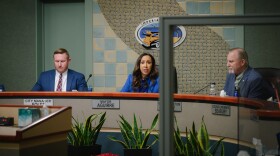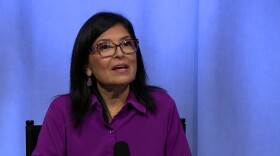The Supreme Court tossed out parts of a campaign finance law that have been around for decades. Businesses and unions now will be able to spend millions of dollars to support or oppose candidates for president and Congress.
One small change that's likely from Thursday's court decision: truth in advertising.
It involves those "issue ads," the ones in which the announcers tell you to call the candidates and set them straight. That line is usually a ruse, dressing up a campaign ad to make it look like it's something else — and thus, under the old rules, something that can be financed with money from corporations, unions and rich people.
With the Supreme Court saying that corporations and unions may pay for all the political ads they want, or can afford, there won't be so much need for the "Call Senator Jones and tell him" rhetoric.
That's just one small benefit of the court's ruling, said David Keating, one of several strategists, consultants and campaign finance lawyers interviewed after the decision was handed down.
"The ads will get more honest," said Keating, director of Club for Growth, a group that supports candidates who call for lower taxes and smaller government. "Instead of having all this nonsense about 'Call him,' they'll tell you what to do: 'Go vote.' "
But honest ads were only a collateral issue on the court's agenda. The objective of the five-justice majority was to free up the speech rights of corporations, overturning statutes and previous court rulings dating back as far as 1947. Corporations, legally considered persons under a Supreme Court case from the 19th century, have more limited First Amendment rights than what are known as "natural persons."
This new First Amendment right of corporations also applies to unions, the court said. But Steve Rosenthal, a longtime strategist in the union and progressive movements, said corporate America starts the new competition with a huge edge.
"To now allow corporations to open their checkbooks and spend as much as they want, it's a very, very big problem," he said. "Unions will never have the type of money that corporations have."
Another, more fundamental competition is affected as well.
"It's a dramatic shift in the allocation of power or influence in campaigns," said Larry Norton, a former general counsel at the Federal Election Commission and now in private practice in Washington.
"Candidates will still be subject to relatively low limits on individual contributions. But they will compete to get their voice heard, and to control the message of the election, with large corporations that will be able to spend unlimited sums on election ads."
Still, the predictions of tidal waves of corporate money are not universal.
Campaign finance lawyer Ken Gross said that when it comes to political money generally, most of his corporate clients "want to know how little they can do and say they're maxed out."
The biggest, publicly held corporations tend to be risk-averse in the political arena. They might hold back, waiting until the Federal Election Commission writes its regulations and other, more daring corporations test the waters of direct political engagement.
Another observer of those adventurous companies will be Chris LaCivita, the conservative consultant who produced the Swift Boat Veterans ads that damaged Democrat John Kerry's 2004 presidential bid.
LaCivita said the 2008 campaign was bad for independent groups. The FEC had penalized Swift Boat Veterans, the Sierra Club and some other big players from the 2004 race. It got the attention of potential donors — corporations and wealthy individuals. So when LaCivita's group, the American Issues Project, went looking for money in 2008, many donors were reluctant to write checks.
"There were some committed Americans who wanted to communicate a message — you know, threats from the government be damned, they were still going to be involved," LaCivita said. "But at the end of the day, we were only able to accomplish a tiny portion, budget-wise, of what we originally set out to do."
He said he expects the court decision to ease donors' minds.
And as he spoke, he sounded like a kid who'd opened his Christmas presents and gotten just what he wanted.
Copyright 2022 NPR. To see more, visit https://www.npr.org. 9(MDAzMjM2NDYzMDEyMzc1Njk5NjAxNzY3OQ001))







